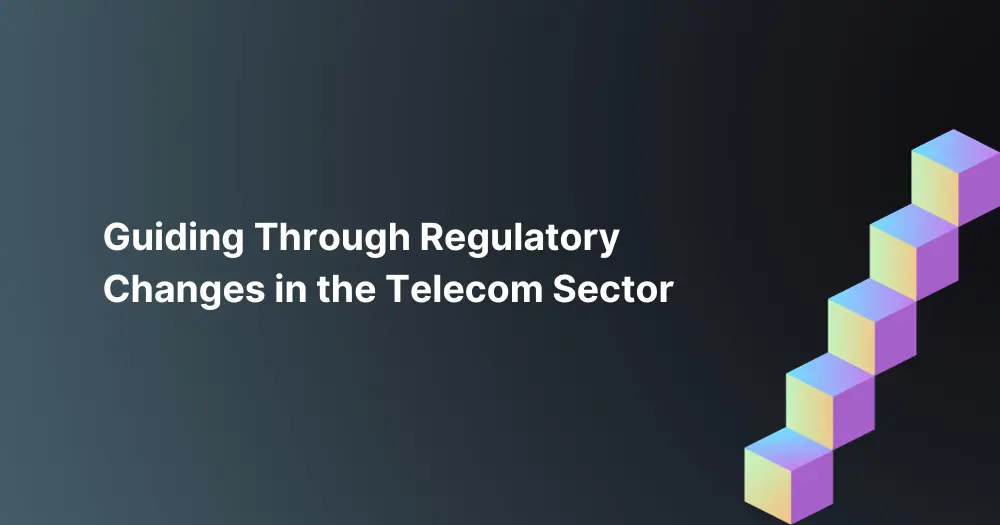
The dynamic nature of the modern world necessitates businesses to constantly adapt and innovate. This reality is particularly pronounced in the telecom sector, where regular regulatory shifts can profoundly influence operations. Understanding these changes and staying current is a legal obligation and a strategic imperative to avert legal and financial complications.
In the telecom sector, stringent regulations are more of a rule than an exception. These norms and requirements, established by various regulatory bodies, aim to ensure fair competition, safeguard consumer rights, and uphold the integrity and security of communication networks. Complying with these regulations is a legal responsibility and a critical business necessity.
Non-compliance can lead to severe consequences. The financial repercussions can be severe, frequently escalating to millions or even billions of dollars. These penalties can significantly affect a company’s financial stability, potentially jeopardizing its survival. The costs of correcting non-compliance, including necessary operational modifications and investments in new systems or technologies, can further add to this financial burden.
The damage to reputation is another severe consequence of non-compliance. A single instance of a regulatory breach can quickly become widely known, resulting in negative publicity and brand damage. Customers, investors, and partners’ confidence could be shaken, impacting customer loyalty, share prices, and business partnerships. Repairing this reputational damage can be long-lasting and more costly than the initial financial penalty.
Business disruption is another risk. Serious regulatory violations can lead to sanctions such as suspending business operations or revoking licenses. This can disrupt revenue streams and endanger the entire business. The time and resources required to address non-compliance and negotiate with regulators can distract from core business activities and strategic initiatives.
However, regulatory compliance is not just about averting negative outcomes. It also opens opportunities. Companies that are well-versed in regulatory changes can use this knowledge to their benefit. They can modify their offerings to comply with new regulations to gain a competitive edge. They can also utilize compliance as a selling point, showcasing their commitment to ethical practices and customer protection to customers.
Staying updated with regulatory changes enables a company to be proactive instead of reactive. Instead of hastily complying after a new regulation comes into effect, a forward-thinking company can plan and implement changes more seamlessly to minimize business disruption.
Regulatory compliance can also enhance operational efficiency. The process of reviewing operations to ensure compliance can uncover inefficiencies and areas for improvement. Many regulations encourage best practices in data security and customer privacy, which can improve business operations.
While keeping current with regulatory changes in the telecom industry requires effort and investment, the benefits significantly outweigh the costs. Regulatory compliance mitigates risks and propels business success by enhancing customer trust, operational efficiency, and competitive advantage.
The telecom sector in the United States has witnessed a series of regulatory changes that have redefined the landscape.
One of the most impactful alterations has been in data privacy. Stricter regulations now govern how businesses collect, store, and use customer data. Businesses have had to revisit their data management strategies, investing in secure and compliant processes to handle customer data.
The advent of 5G technology has also introduced new standards and requirements. Businesses must follow these newly introduced regulations to continue providing the top-notch services that customers demand and comply with legal obligations. This has necessitated adjusting service delivery models, investing in new technology, and training staff on new protocols.
New compliance requirements have surfaced that touch on various aspects of telecom operations, from service delivery to billing. Tracking these changes and implementing necessary adjustments has become crucial to maintaining smooth operations and avoiding regulatory pitfalls.
These instances underscore how swiftly the regulatory environment in the telecom sector can change. It vividly illustrates why businesses must stay updated on these changes. Proactively understanding and adapting to new regulations can help businesses avoid fines and penalties, protect their reputation, and discover new growth opportunities.
Staying abreast of regulatory changes in the telecom industry is an ongoing process that requires active engagement and vigilance. Here are some strategies to stay informed:
Keeping up with regulatory changes ensures compliance and gives businesses a competitive edge by enabling them to adapt quickly to new requirements.
In terms of cost-effective compliance solutions, outsourcing compliance tasks to external specialists allows businesses to focus on their core activities while ensuring they meet all relevant regulations. These experts have in-depth knowledge of telecom regulations and keep up-to-date with any changes, ensuring businesses stay compliant. They can also advise on how to best meet compliance requirements in the most efficient manner, helping to reduce costs further.
With the right strategies, managing compliance doesn’t have to be a burdensome cost. Businesses can ensure they meet regulatory requirements cost-effectively and focus on growth and innovation.
BlackPoint IT‘s telecom consultants are experts in navigating the ever-changing telecom landscape. Our commitment to your business includes guiding you through regulatory changes with strategic planning and operational efficiency services. We ensure your telecom structure remains compliant, helping your business thrive amidst these shifts. Don’t navigate this terrain alone; contact us for a consultation, and let us streamline your telecom operations.